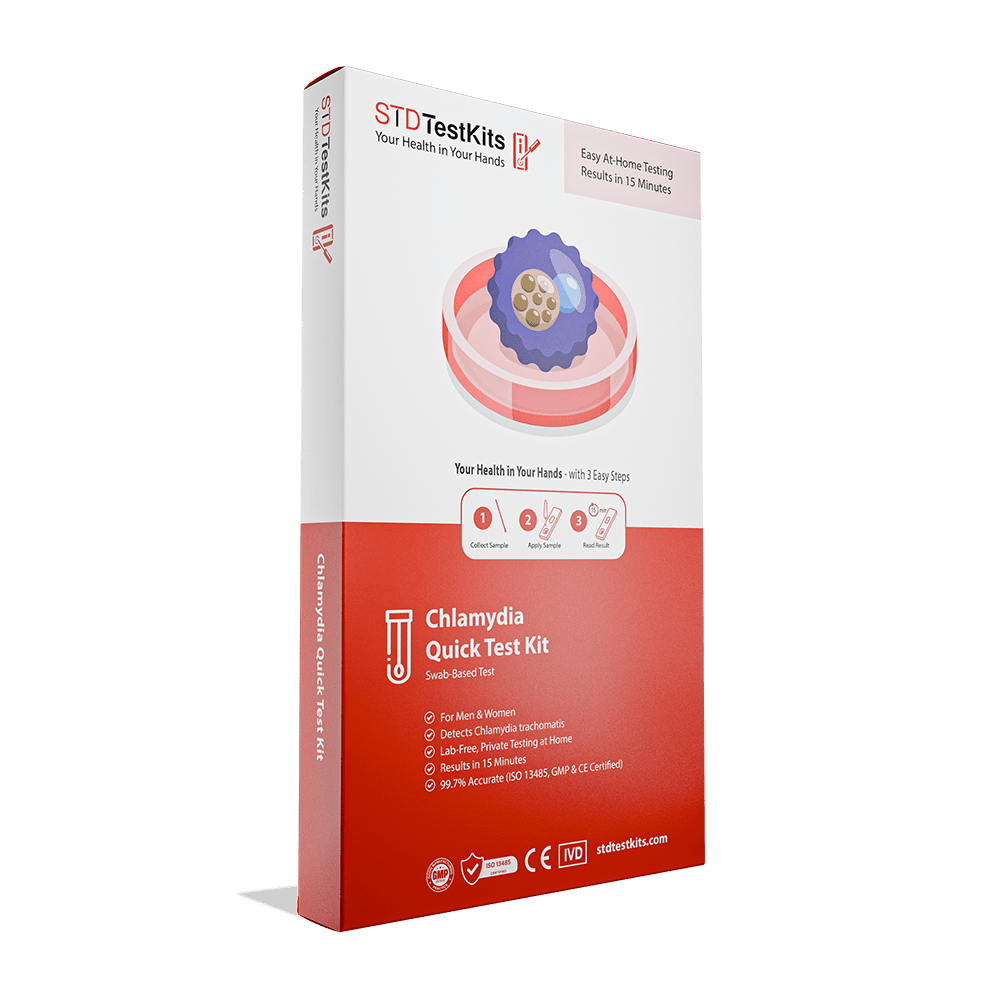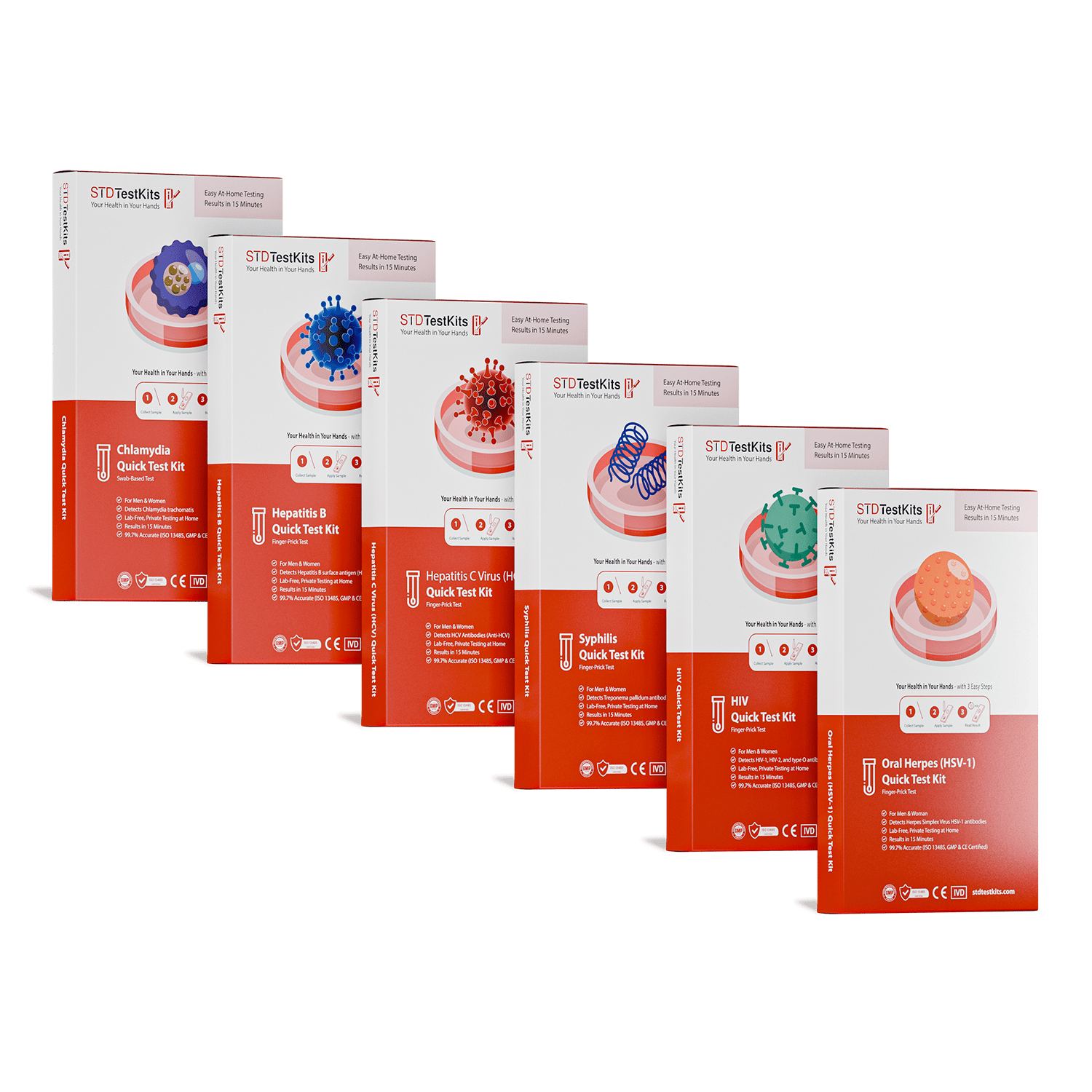Oral Thrush or Oral STD? What That White Tongue Really Means
Quick Answer: You should not have sex while infected with chlamydia. After completing antibiotic treatment and waiting 7 full days, sex can resume safely, if all partners are also treated and symptom-free.
This Doesn’t Feel Like an STD, But It Is
Most people don’t feel sick when they have chlamydia. In fact, roughly 70% of women and 50% of men experience no symptoms at all. That’s what makes it so easy to spread unintentionally, through oral, vaginal, or anal sex.
But for those who do notice something, symptoms can include:
- Unusual discharge (thin, cloudy, yellow, or milky)
- Pain or burning when peeing
- Rectal pain or bleeding after anal sex
- Pelvic or testicular pain
- Bleeding between periods
What chlamydia rarely brings? Drama. It’s subtle. It doesn’t announce itself. And that’s why so many people have sex without realizing they’re contagious.
“We thought it was a UTI,” said Jared, 26. “She had some pain after sex, I didn’t feel anything. We kept hooking up. By the time I got tested, I’d already passed it back to her again.”

People are also looking for: Can You Get Hepatitis B From Oral Sex?
Yes, Chlamydia Can Spread During Oral and Condom Sex
This STD doesn’t need a broken condom or wild weekend to take hold. It thrives in the throat, urethra, cervix, and rectum, and spreads through fluid contact during:
- Oral sex (giving or receiving)
- Vaginal or anal penetration
- Shared sex toys without proper cleaning
Even if you used protection, chlamydia can still spread, especially during oral sex, or if the condom didn’t cover the infected area completely. Many people assume condoms = complete safety. That’s a myth we need to retire.
“I used condoms religiously,” shared Cindy, 23. “But he went down on me every time. We both tested positive for chlamydia a month later.”
If you’ve already had sex with someone while infected, or think you might be infected, here’s what you need to do next:
- Stop all sexual activity until you're tested and treated
- Tell your recent partners (within the last 60 days)
- Start antibiotics ASAP, usually a 7-day course of doxycycline
- Wait 7 days after treatment before having sex again
- Get re-tested in 3 months, especially if under 25 or at high risk
This isn’t punishment, it’s prevention. Even if you feel fine, chlamydia can lead to pelvic inflammatory disease (PID), infertility, and epididymitis in the long run. Reinfection is common if partners aren’t treated at the same time.
How Long After Treatment Can You Have Sex Again?
The official guidance is clear: Wait 7 days after finishing your antibiotics before having any sexual contact. That includes oral, vaginal, anal, or toy play. Why 7 days? Because even if the bacteria dies off quickly, you’re still contagious until the full treatment window closes. Having sex too soon can:
- Reinfect your partner (especially if they haven’t been treated yet)
- Complicate symptoms or prolong healing
- Delay your full recovery if your immune system is already strained
Also important: Your partner(s) must complete treatment, too. If only one of you gets meds, chlamydia becomes a ping-pong infection, bouncing back and forth, often without symptoms.
Here’s what one infectious disease doctor told Healthline:
“One of the most common reasons for reinfection is that only one partner got treated. Sex resumes too soon, and the cycle continues.”
Once the 7-day window has passed and both you and your partner(s) have been treated, you can have sex again safely. But it’s normal to feel anxious, awkward, or even ashamed during that first time back.
Here’s how to reclaim pleasure and protect your health at the same time:
- Start with honesty: If you’re nervous, say so. Intimacy doesn’t require silence.
- Use condoms or dental dams: Especially if you’re exploring with someone new or haven’t seen updated test results.
- Check in about symptoms: No discharge, pain, or itching? Good. Still, routine testing matters.
- Get retested in 3 months: Reinfection is common. This is especially vital for people under 25 or with new partners.
“I didn’t want to touch anyone after my diagnosis,” said Nico, 32. “But my partner said, ‘Getting tested was hot. It shows you care.’ That changed everything.”
Testing isn’t rejection. It’s respect. It means you care enough about your body, and your partners’, to show up fully, cleanly, and clearly.
Is It Ever Safe to Have Sex While Waiting for Results?
Short answer: No. If you suspect chlamydia, or if a partner tested positive, you should pause all sexual activity until you know your status. Here’s why:
- You may be contagious without symptoms
- Even one encounter can cause complications like PID or testicular inflammation
- Delays in testing or treatment extend the risk window for everyone involved
If you’re waiting for results and still want to connect physically, consider non-genital intimacy: massage, mutual masturbation, or just being close without crossing fluid boundaries. Yes, it can still be hot, and safe.

People are also reading: Hepatitis C Symptoms: Gender Differences You Should Know
How to Tell Someone You Have (or Had) Chlamydia
This is where a lot of people freeze. They’d rather ghost a hookup or lie to a partner than say the words: “I tested positive for chlamydia.” But here’s the truth: most people don’t react with disgust, they react with curiosity, confusion, or relief.
Here are a few ways to start the conversation:
- “I just found out I tested positive for chlamydia. I wanted you to know because I respect you.”
- “This is awkward, but I care about being real, so here’s what’s up…”
- “I didn’t have symptoms, but I got tested just in case. You might want to, too.”
If someone shames you for being honest, that says more about them than you. STDs are not moral failures. They’re bacterial infections, and with chlamydia, they’re curable.
“When I told my ex I had chlamydia, he admitted he’d had it before too. We just… never talked about it,” said Lena, 29. “Now I tell new partners early. It's a filter for people I can actually trust.”
Dating With Chlamydia: You’re Still Desirable
Let’s be clear: having chlamydia doesn’t make you dirty, irresponsible, or undateable. It makes you human. And in a world where 1 in 20 sexually active young people will get chlamydia this year, you’re far from alone.
If you’ve been diagnosed, or even if you’re just worried, you might ask yourself:
- “Will anyone want to sleep with me again?”
- “Should I even bother dating right now?”
- “Do I have to disclose to everyone forever?”
The answers: Yes. Yes. And no.
Once treated and cleared, you don’t owe every future partner a full sexual résumé. But if you’re navigating ongoing exposure, testing windows, or new symptoms, communication is protection, not just for them, but for you too. There’s something deeply sexy about someone who gets tested, knows their status, and takes initiative. If someone can’t handle that, they’re not ready for you.
What Happens If You Have Sex With Chlamydia and Don’t Know It?
If you’ve already had sex and only now realize you or your partner might have chlamydia, here’s what’s at stake:
- Increased risk of complications: PID, infertility, chronic pelvic pain, and testicular damage
- Reinfection loop: You and your partner can keep giving it back to each other unknowingly
- Silent spread: Especially if neither of you have symptoms
But here’s the good news: you can stop it here. Get tested. Get treated. Wait the full 7 days. Talk to your partners. And protect your future health by using protection and retesting every few months if you're sexually active with new or multiple partners.
FAQs
1. Can I have sex while I’m being treated for chlamydia?
Nope. Even if you feel fine or halfway through your meds, you’re still contagious. Think of it like antibiotics needing time to fully kick the infection out, and sex before that just hits rewind.
2. I had sex and then found out I had chlamydia. Did I mess up everything?
Not at all. You’re not the first or the last, most people don’t realize they’re infected until after they’ve already had sex. Just hit pause now, tell your partners, and start treatment. That’s the fix.
3. Do I have to tell someone I had chlamydia six months ago?
Only if it’s relevant. If you were treated, waited your 7 days, and tested negative since? It’s behind you. But if you’re in a new relationship and still figuring things out, honesty can build trust. Your call.
4. Can I still give someone chlamydia if I don’t have symptoms?
Yep. That’s the sneaky part, chlamydia often shows up with zero signs. You could be totally symptom-free and still pass it on. That’s why regular testing is your best friend.
5. Does this mean my partner cheated on me?
Not necessarily. Chlamydia can hang out undetected for weeks, or even months. One of you could’ve been carrying it from before your current relationship. Don’t jump to blame. Jump to testing.
6. How long after taking antibiotics is it safe to have sex again?
Seven full days after you take your last pill. Not six. Not “almost a week.” The full seven. And make sure your partner gets treated too, otherwise, it’s a boomerang.
7. Is oral sex safe if I have chlamydia?
Not really. Chlamydia can live in the throat, and oral sex absolutely counts when it comes to transmission. If you're mid-treatment or untested, skip it, or use a barrier like a condom or dental dam.
8. Can I get chlamydia again from the same partner?
Unfortunately, yes. If they weren’t treated or resumed sex too soon, reinfection is a real thing. It’s not personal, it’s just bacteria doing what bacteria does.
9. Does chlamydia mean I can’t date right now?
Definitely not. You can still flirt, sext, date, fall in love, have fun, just take a timeout on the physical stuff until you're cleared. In the meantime, emotional intimacy gets to shine.
10. Do condoms fully protect against chlamydia?
They help a lot, but they’re not bulletproof. Chlamydia can still spread through areas not covered by a condom, or during oral sex. Think of condoms as your armor, not your invisibility cloak.
You Deserve Answers, Not Assumptions
Having chlamydia doesn’t mean you’re reckless. It means you’re sexually active in a world where STDs are incredibly common, and often silent. What matters is what you do next.
Testing, treatment, honesty, and time. That’s all it takes to reclaim your sex life and protect your health. No shame. No drama. Just facts, and a fresh start.
Don’t wait and wonder, get the clarity you deserve. This at-home combo test kit checks for the most common STDs discreetly and quickly.
Sources
1. STD Treatment Guidelines for Chlamydia – CDC
2. When Can I Have Sex Again After My Chlamydia Treatment? – CDC
3. Chlamydia: Care Instructions – MyHealth Alberta
4. Chlamydia – Treatment and Prevention – NHS
5. The Facts on Chlamydia – University of Rochester Medical Center







